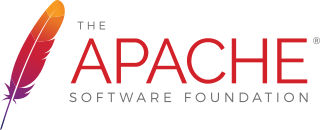The MIT License is a permissive software license originating at the Massachusetts Institute of Technology (MIT) in the late 1980s. As a permissive license, it puts very few restrictions on reuse and therefore has high license compatibility.

Open-source licenses are software licenses that allow content to be used, modified, and shared. They facilitate free and open-source software (FOSS) development. Intellectual property (IP) laws restrict the modification and sharing of creative works. Free and open-source licenses use these existing legal structures for an inverse purpose. They grant the recipient the rights to use the software, examine the source code, modify it, and distribute the modifications. These criteria are outlined in the Open Source Definition.

The Open Source Initiative (OSI) is the steward of the Open Source Definition, the most widely used standard for open-source software.

The Apache License is a permissive free software license written by the Apache Software Foundation (ASF). It allows users to use the software for any purpose, to distribute it, to modify it, and to distribute modified versions of the software under the terms of the license, without concern for royalties. The ASF and its projects release their software products under the Apache License. The license is also used by many non-ASF projects.
The Open Software License (OSL) is a software license created by Lawrence Rosen. The Open Source Initiative (OSI) has certified it as an open-source license, but the Debian project judged version 1.1 to be incompatible with the DFSG. The OSL is a copyleft license, with a termination clause triggered by filing a lawsuit alleging patent infringement.
The Mozilla Public License (MPL) is a free and open-source weak copyleft license for most Mozilla Foundation software such as Firefox and Thunderbird. The MPL license is developed and maintained by Mozilla, which seeks to balance the concerns of both open-source and proprietary developers; it is distinguished from others as a middle ground between the permissive software BSD-style licenses and the GNU General Public License. So under the terms of the MPL, it allows the integration of MPL-licensed code into proprietary codebases, but only on condition those components remain accessible.
Alternative terms for free software, such as open source, FOSS, and FLOSS, have been a controversial issue among free and open-source software users from the late 1990s onwards. These terms share almost identical licence criteria and development practices.
This comparison only covers software licenses which have a linked Wikipedia article for details and which are approved by at least one of the following expert groups: the Free Software Foundation, the Open Source Initiative, the Debian Project and the Fedora Project. For a list of licenses not specifically intended for software, see List of free-content licences.
The PHP License is the open-source license under which the PHP scripting language is released. The PHP License is designed to encourage widespread adoption of the source code. Redistribution is permitted in source or binary form with or without modifications, with some caveats.

The WTFPL is a permissive free software license. As a public domain like license, the WTFPL is essentially the same as dedication to the public domain. It allows redistribution and modification of the work under any terms. The name is an abbreviation of Do What The Fuck You Want To Public License.

Public-domain-equivalent license are licenses that grant public-domain-like rights and/or act as waivers. They are used to make copyrighted works usable by anyone without conditions, while avoiding the complexities of attribution or license compatibility that occur with other licenses.
The University of Illinois/NCSA Open Source License, or UIUC license, is a permissive free software license, based on the MIT/X11 license and the 3-clause BSD license. By combining parts of these two licenses, it attempts to be clearer and more concise than either.
License proliferation is the phenomenon of an abundance of already existing and the continued creation of new software licenses for software and software packages in the FOSS ecosystem. License proliferation affects the whole FOSS ecosystem negatively by the burden of increasingly complex license selection, license interaction, and license compatibility considerations.
License compatibility is a legal framework that allows for pieces of software with different software licenses to be distributed together. The need for such a framework arises because the different licenses can contain contradictory requirements, rendering it impossible to legally combine source code from separately-licensed software in order to create and publish a new program. Proprietary licenses are generally program-specific and incompatible; authors must negotiate to combine code. Copyleft licenses are commonly deliberately incompatible with proprietary licenses, in order to prevent copyleft software from being re-licensed under a proprietary license, turning it into proprietary software. Many copyleft licenses explicitly allow relicensing under some other copyleft licenses. Permissive licenses are compatible with everything, including proprietary licenses; there is thus no guarantee that all derived works will remain under a permissive license.

A free-software license is a notice that grants the recipient of a piece of software extensive rights to modify and redistribute that software. These actions are usually prohibited by copyright law, but the rights-holder of a piece of software can remove these restrictions by accompanying the software with a software license which grants the recipient these rights. Software using such a license is free software as conferred by the copyright holder. Free-software licenses are applied to software in source code and also binary object-code form, as the copyright law recognizes both forms.
BSD licenses are a family of permissive free software licenses, imposing minimal restrictions on the use and distribution of covered software. This is in contrast to copyleft licenses, which have share-alike requirements. The original BSD license was used for its namesake, the Berkeley Software Distribution (BSD), a Unix-like operating system. The original version has since been revised, and its descendants are referred to as modified BSD licenses.

Copyleft is the legal technique of granting certain freedoms over copies of copyrighted works with the requirement that the same rights be preserved in derivative works. In this sense, freedoms refers to the use of the work for any purpose, and the ability to modify, copy, share, and redistribute the work, with or without a fee. Licenses which implement copyleft can be used to maintain copyright conditions for works ranging from computer software, to documents, art, and scientific discoveries, and similar approaches have even been applied to certain patents.

The GNU General Public License is a series of widely used free software licenses, or copyleft, that guarantee end users the four freedoms to run, study, share, and modify the software. The license was the first copyleft for general use, and was originally written by Richard Stallman, the founder of the Free Software Foundation (FSF), for the GNU Project. The license grants the recipients of a computer program the rights of the Free Software Definition. The licenses in the GPL series are all copyleft licenses, which means that any derivative work must be distributed under the same or equivalent license terms. It is more restrictive than the Lesser General Public License, and even further distinct from the more widely-used permissive software licenses such as BSD, MIT, and Apache.
The Shared Source Initiative (SSI) is a source-available software licensing scheme launched by Microsoft in May 2001. The program includes a spectrum of technologies and licenses, and most of its source code offerings are available for download after eligibility criteria are met.
Software relicensing is applied in open-source software development when software licenses of software modules are incompatible and are required to be compatible for a greater combined work. Licenses applied to software as copyrightable works, in source code as binary form, can contain contradictory clauses. These requirements can make it impossible to combine source code or content of several software works to create a new combined one.






